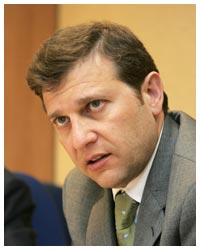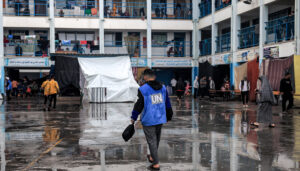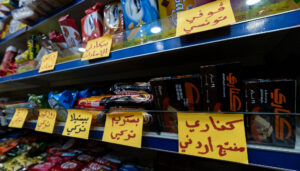 Written By: Khalid Irani
Written By: Khalid Irani
Minister of Environment – Jordan
To begin with, I would like to state that I am big fan of the new social media tools that have brought people of different nationalities, intellectual backgrounds, professions, social strata and ideologies closer together and brought down a lot of communication barriers. To utilize social media in advocating environmental causes is a powerful approach for education, awareness and knowledge sharing that was not available in the early, difficult days of environmental activism.
I am impressed to know that the bloggers community has decided to dedicate Blogging Action Day 2009 to the issue of climate change. This will be a fantastic opportunity to express and exchange opinions amongst politicians, activists, students, locals, investors, civil society leaders, field practitioners and media professionals with a common concern. Such a dialogue should be open and rich and provide new insights on how to deal with the challenge of climate change at the global and national levels. As I know the huge potential of blogging in networking via social media tool, please bare with in a long post in which I try to present an insight on Jordan’s view of the complexity of climate change issues at the global and national levels. For future updates up you can always follow me on Twitter.
The eyes, minds and hearts are now entirely focused on the Copenhagen meeting in December 2009 that is supposed to design a new global agreement on how to deal with climate change after 2012, when the currently implemented Kyoto protocol will expire.
We all know how a profound challenge it would be to reach a global agreement on a post Kyoto Climate Change regime that would balance the rights and responsibilities of the developed and developing world. The Bali action plan that resulted from the negotiations in 2007 has set out the main principles. It demands developed countries to consider “Measurable, reportable and verifiable nationally appropriate mitigation commitments or actions, including quantified emission limitation and reduction objectives”.
On the other hand, developing countries have been also assigned with an important responsibility to consider “Nationally appropriate mitigation actions in the context of sustainable development, supported and enabled by technology, financing and capacity-building, in a measurable, reportable and verifiable manner”. It is vital at this stage to emphasize that the Bali Action Plan did not commit developing countries with quantified emission reduction targets, but many developing countries have introduced voluntary and nationally-based measures for mitigation that would pave the way for a comprehensive partnership provided that an agreement was reached, and it should be reached in Copenhagen.
We are aware of the challenges but still we should focus on the opportunities. It can be a positive irony that the latest economic recession acted as an alarm bill to help us realize the opportunities embedded in the recession. In 2009 global carbon emissions have already dropped by 2.6% which is the largest reduction in 40 years. This is a moment in time that can be used to enhance emission reductions by a gradual transition to a green economy. The alternative is the development, nourishment and maintenance of a green market that will assist in a transition to a sustainable economic system based on appropriate resource management while creating careers for a new pool of professionals in environmental management and technology.
During the past week, I have been in Cairo participating in the meeting of Council of Arab Ministers Responsible for the Environment where the council has adopted a suggestion presented by Jordan to establish a monitoring team of experts that will produce a detailed report describing the observed and potential impacts of Climate Change on the Arab countries that will act as a decision-making tool for Arab negotiators in Copenhagen. After Cairo, I participated in the Euro-Med Parliamentary Assembly in Linz, Austria where the focus was on the Copenhagen process and the position and perspectives of the Euro-Med partnership on Climate Change negotiations. This dynamic process of consultation at the regional and global levels should be able to facilitate the possibility of striking the required deal in Copenhagen.
Let me focus here on the position of Jordan in relation to Climate Change.
Although Jordan does contribute a mere 0.1% of global carbon emissions it maintains strong commitment to the objectives developed by the international community for the integrated environmental and economic response to the threat of climate change. Global Climate scenarios developed by the Intergovernmental Panel on Climate Change (IPCC) have also indicated that Jordan and the Middle East will suffer from reduced agricultural productivity and water availability among other negative impacts.
At the heart of our environmental agenda and climate change mitigation measures lies the issue of energy, which is considered as a challenge and an opportunity. Jordan is currently undergoing a paradigm shift in terms of energy policy planning. A combination of both necessity and conviction has worked together to drive a much needed vision for the development of renewable energy as a major contributor to the energy mix. The increasing oil prices, plus the growing awareness of the vital need of developing green energy options have a synergistic impact on the political decision making process
Jordan has recently developed its modified national energy strategy 2008-2020 through a national committee established by a Royal Decree. The strategy has suggested a robust package of legislative, administrative and technological innovations aiming to steer the country into more reliable, sustainable and environmentally friendly energy resources. In the new strategy the share of renewable energy resources will be increased from a mere 1% now to 10% in 2020. The previous target was 3% developed by the National Agenda in 2005.
This transition will require profound capital investments, technology transfer and human resources development to produce a solid base to maintain and enhance this positive change. This transition should be done through a package of investments estimated at US $ 1.4 – 2.2 billion. The investment package includes Build-Operate-Transfer (BOT) deals for wind energy with a total capacity of 660 MWs and solar energy innovations for 400 MW. This will be paralleled with the reduction of energy produced from oil from 58% currently to 40% in 2020.
We are aware of the existence of several barriers against the installation of renewable energy at a commercially feasible level. Regulatory and legislative barriers can be removed by the new energy law, while technological barriers will prove to be more difficult as they entail huge investments and know-how to upload renewable energy to the existing national electricity grid.
The strategy includes other recommendations on energy conservation that includes grant exemptions to energy-saving vehicles, exempting solar water heaters from sales tax and implementation of building code regulations than conserve the energy and create a national award for rationalization of energy consumption. The strategy will be supported by a “Renewable Energy Law”. The draft law includes regulations and incentives for renewable energy production from investments in areas designated to be utilized to build renewable energy facilities. The law provides investors with a lot of incentives including 100% exemption from income tax for 10 years.
The government of Jordan has also established a new Energy Fund to support the infrastructure development of new renewable energy facilities. In addition the government is seeking to provide tax incentives to remove the barriers for the comprehensive use of energy efficiency and renewable energy technologies in the Jordanian market. The benefits are awesome and should be pursued vigorously. I once estimated that when oil was about 100 US$ a barrel, a mere 20% saving in our energy bill translated into a saving of around 1 billion US$ in oil imports a year.
Carbon trading is also another big opportunity for Jordan. We have just registered and certified our first carbon trade project allowing us to sell 21 million USD in carbon credits. More projects are expected to follow in the near future.
At the adaptation to climate change front Jordan is facing a severe challenge in water scarcity to be magnified by the impacts of Climate Change. Jordan is statistically the fourth most water scarce country in the world with a per capita share of 150 Cubic meters. In a harsh natural environment with limited surface water and rapidly utilized groundwater, lack of adequate financial resources for desalination Jordan is at the front line in the regional fight for innovative solutions to water scarcity problems. The findings of Jordan’s second national communication on Climate Change suggest a reduction of 20% in precipitation in some of the major watersheds in Jordan in the coming 50 years, which will increase of burden and challenge of water resource management in Jordan.
One of our main objectives is to maximize the use of available water through water conservation, modification of allocation schemes to respond to growing needs for clean and sustainable drinking water and substitution of freshwater with reclaimed water for agriculture. Jordan is currently undergoing a comprehensive assessment and planning process to enhance the adaptive capacity of the water sector to the potential impacts of climate change. Priority actions and choices will be developed within the context of integrated water resource management and the focus on providing adequate water to meet the Millennium Development Goals and national water and environment objectives.
Long term solutions for water scarcity have to be crafted out from the most daring and unconventional sources. Jordan’s landmark project is the water conveyor from the Red Sea to the Dead Sea. The water resulting from the desalination process will be used for the restoration of the water level at the Dead Sea which is subject to rapid reduction. This project is currently subject to an extensive environmental and social feasibility study that will determine the most environmentally suitable guidelines for implementation.
We as environmentalists can occasionally fall into the utopian ambition of saving the world with our actions. The world will however, remain long after we perish. What we’d better seek is to save our own future now before it is too late for us to face the retaliation of nature.










